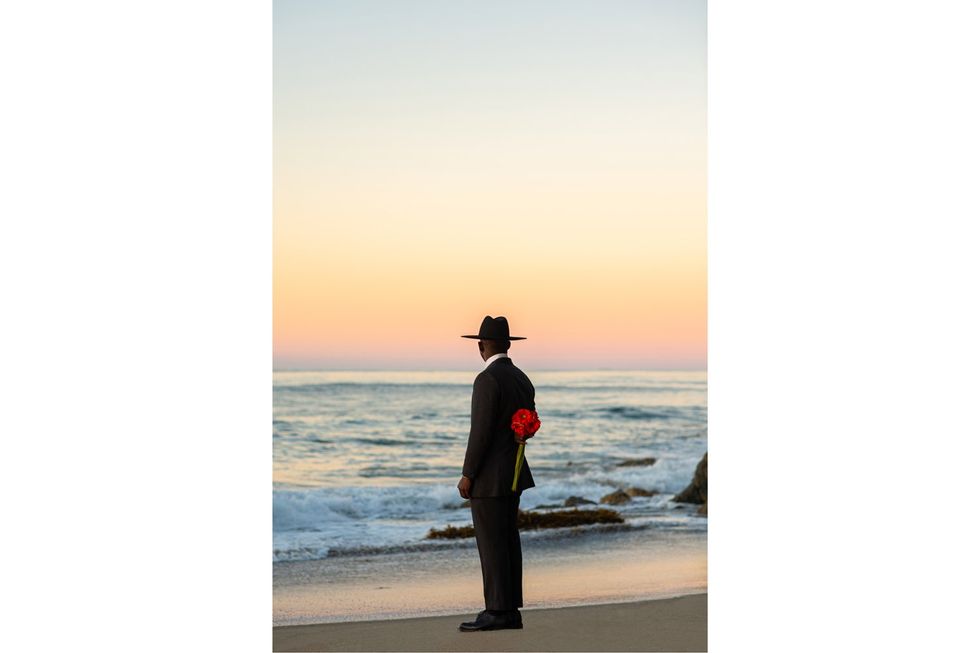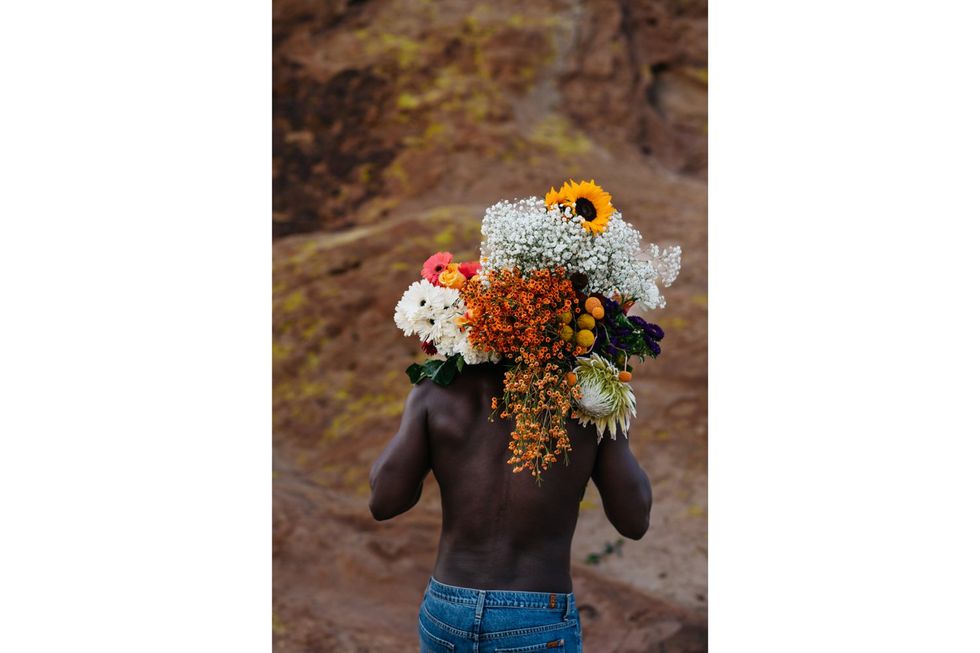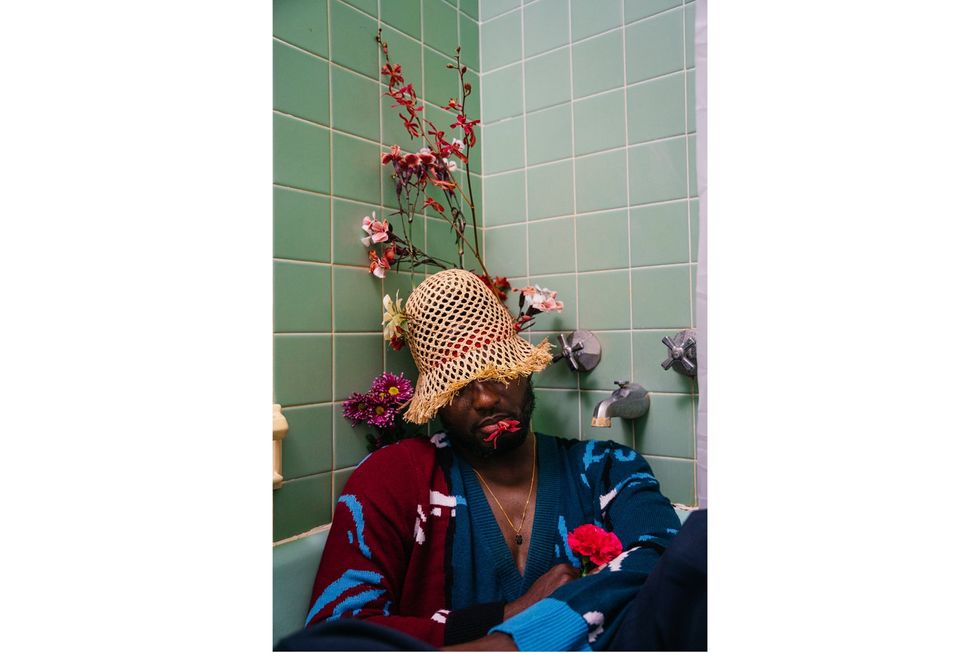Photos: Nigerian Photographer Steven Onoja Captures the 'Sound of Pain'
The New York-based creative takes us through some of the images in his debut photobook Sound of Pain.

Nigerian photographer Steven Onoja in his debut photobook 'Sound of Pain.'
The loss of a family member, more specifically a parent, is an experience that feels overwhelmingly isolating. For Nigerian photographer, creative director, and wordsmith, Steven Onoja, losing his mother in 2020 brought with it uncomfortable emotions and the unmasking of painful family dynamics. The discovery of foul play in his mother’s passing, too, was an agonizing experience on his life journey that excruciatingly pushed the New York City-based fashion blogger and creative to do what he does best — create.
As a means of processing his diverging world and the people in it, Onoja fashioned his debut photo book, Sound of Pain – a collection of immensely personal writings and gorgeous photographs that speak life into and animate his experience.
As Africans, we are not known for our emotional expressiveness or even ability to hold space for the feelings of others – worse even for our male counterparts. As a Nigerian man, Onoja’s transparency and fluid imagery in his book is a breath of fresh air, marking a powerful move in a direction where African men can express their emotions and still feel like African men. As Onoja shares in the book, his uncle, at the news of his mother’s passing, said to him: “cry yourself out and be a man.” The vibrant, emotive images and striking text paired together underline Onoja’s raw vulnerability, acting both as a cathartic release and an invitation for his fellow African men to allow themselves to do the same — even if it begins as a whisper.
Here, Onoja shares five standout images from his book with OkayAfrica, giving us a deeper understanding of the sentiment and his thought processes behind each click of the camera, in excerts edited for length and clarity.

Steven Onoja: When I sit down to write, my thoughts and ideas are heavily influenced by the present moment. Whether it's the emotions and feelings that I am experiencing at the time or the events and circumstances that are unfolding around me, it all seems to seep into my writing somehow. I've come to embrace this aspect of my writing process, as it adds depth and authenticity to my work that readers can connect with.
I think, like most kids growing up in Africa, they have experienced such in one way or the other, and that led to my obsession looking for an answer instantly because I have seen it first hand, so it was easier for me to put it into words and photography.
I created the mood board and sent it to my friends who ended up working with me on this project. The book is a memoir with photos he took and those of himself taken by other people.

This image of flowers behind the back is inspired by gratitude and love. I strive to use stunning visuals and emotional connections to appreciate and celebrate motherhood with its details and soothing colors. "I will travel miles to give you these flowers, mama."

This piece is a lovely representation of the power of silence, the true essence of peace and stillness I was going through. The moment I realized foul play in my mother's death as I was told not to return to Nigeria for the funeral was when I decided to write the book Sound of Pain. It is beyond being vulnerable, but preventing others from experiencing it is important.

I wanted to focus on a story we are all too shy to talk about. We are told not to speak about it. I aim to focus on the importance of myths as privileged access to a particular culture and explore the complexity surrounding families' greed.
As someone who has experienced a lot of pain in my life, writing Sound of Pain was a deeply therapeutic experience for me. It allowed me to express my emotions and thoughts in a way I couldn't in everyday conversation and helped uncover many things I never knew about myself and my family.
The text is only beginning. It's only the beginning. There's a lesson that some people need to learn or unlearn.

At some point in our lives, we will all experience loss. It's a natural part of the human experience. The pain can be overwhelming, whether we're facing the loss of a loved one, a job, a relationship, or something else entirely but it's important to remember that we're not alone in our grief.
This is the story I have heard over and over again. Very relatable but has never been spoken about. The tale I tell is full of sadness and tragedy, but inexplicably I was born with a smile. A constant battle surrounding her death and the African spirituality and family politics besieged, encircling malevolent and benevolent.
The similarity in our stories, the shared experiences as we discover things within us.
Sound of Pain by Steven Onoja is available here.
- Studio Africa: Nigerian Photographer Andrew Esiebo On The Fantasy-Spaces Of West African Barbershops ›
- Etinosa Yvonne's Photography Shines Light on the Mental Health of Nigerians Accused of Witchcraft ›
- Limit(less): A Groundbreaking New Photo Project On LGBTQ African Style In The U.S. ›
- This Nigerian British Photographer Traces the Evolution of the Head Wrap from ‘Moussour to Tignon’ ›

